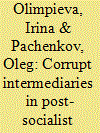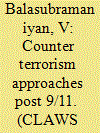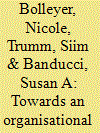| Srl | Item |
| 1 |
ID:
122825


|
|
|
|
|
| Publication |
2013.
|
| Summary/Abstract |
Using the example of intermediaries in business-state relations, this essay addresses the evolution of corruption in Russia which has been facilitated by the introduction of a neoliberal system of market relations. Based on empirical studies of small and medium-sized enterprises in Russia, the essay demonstrates how intermediaries (which are also present in Western market economies and serve the function of reducing firms' transaction costs) have adapted to the local system in order to serve as providers of both legal and illegal (corrupt) services. Disputing the pervasive claim that neoliberalism and corruption are mutually exclusive phenomena, we argue that in 'incoherent' democracies like Russia, where properly functioning democratic institutions and a developed civil society are lacking, neoliberalism has led to the expansion of corruption.
|
|
|
|
|
|
|
|
|
|
|
|
|
|
|
|
| 2 |
ID:
131031


|
|
|
|
|
| Publication |
2014.
|
| Summary/Abstract |
Most studies on terrorism and political violence by experts and researchers have focussed on the causation factors of terrorism over the years. A majority of the scholarly works has mostly focussed on the historical, ideological, and etiological aspects of terrorism and insurgency. Scholars, researchers and investigators have attempted to epitomise and de?ne terrorism as a phenomenon, and have admitted to the problems in ?nding a universally acceptable de?nition. They have primarily focussed on bringing out an acceptable definition of terrorism in all its manifestations and forms, and in the process, have analysed the roots, origins and growth of terrorism. Compared to the enormous literature on the growth and incline of terrorism the world over, studies or scholarly works on the decline of terrorism or insurgency are not as vast and are limited in number.' A few experts like Martha Crenshaw and Audrey Cronin have dealt with this aspect in detail.' However, these attempts comprise only a fragment of the total terrorism literature in place.
|
|
|
|
|
|
|
|
|
|
|
|
|
|
|
|
| 3 |
ID:
120139


|
|
|
|
|
| Publication |
2013.
|
| Summary/Abstract |
Which parties represented in the European Parliament (EP) are able to extract regular donations from their MEPs' salaries and, if they extract donations, how great are they? In the literature on party finances, there has been a lack of attention paid to the use of salaries of elected representatives as a source of funding. This is surprising given that the national headquarters of many parties in Europe regularly collect 'party taxes': a fixed (and often significant) share of their elected representatives' salaries. In filling this gap, this article theoretically specifies two sets of party characteristics that account for the presence of a taxing rule and the level of the tax, respectively. The presence of a tax depends on the basic 'acceptability' of such an internal obligation that rests on a mutually beneficial financial exchange between parties' campaign finance contributions to their MEPs and MEPs' salary donations to their parties. The level of the tax, in contrast, depends on the level of intra-organisational compliance costs and parties' capacity to cope with these costs. Three factors are relevant to this second stage: MEPs' ideological position, the size of the parliamentary group and party control over candidate nomination. The framework is tested through a selection model applied to a unique dataset covering the taxing practices in parties across the European Union Member States.
|
|
|
|
|
|
|
|
|
|
|
|
|
|
|
|